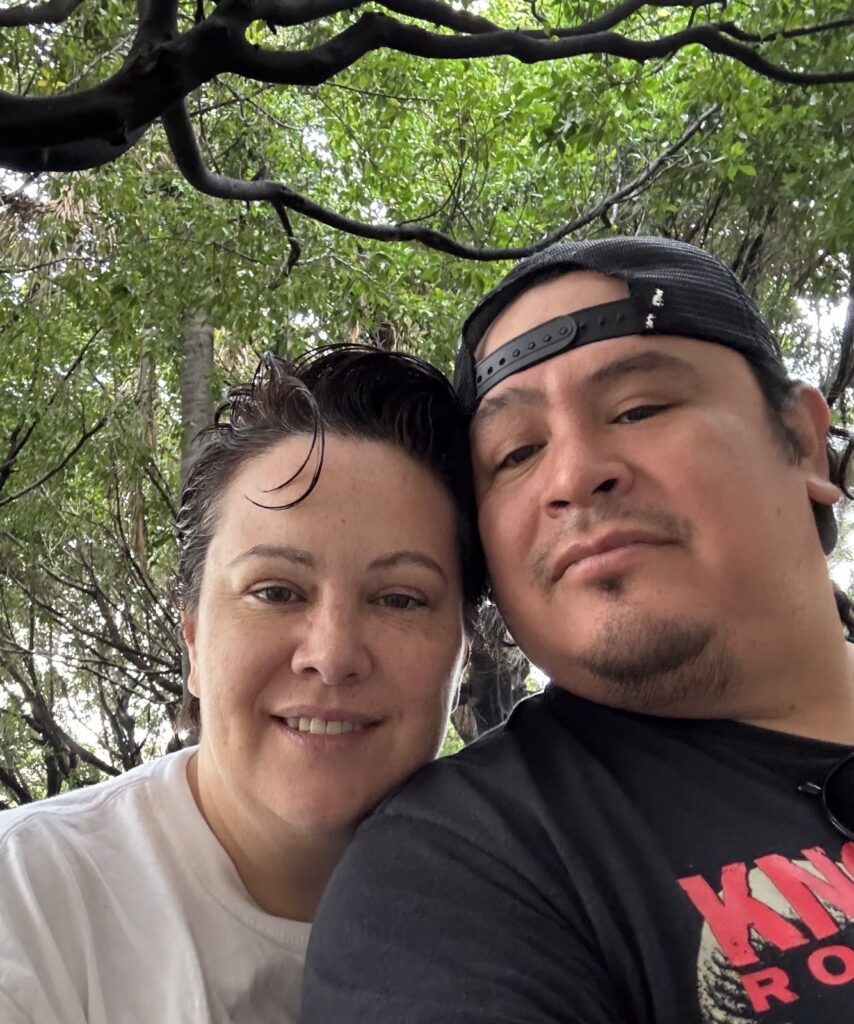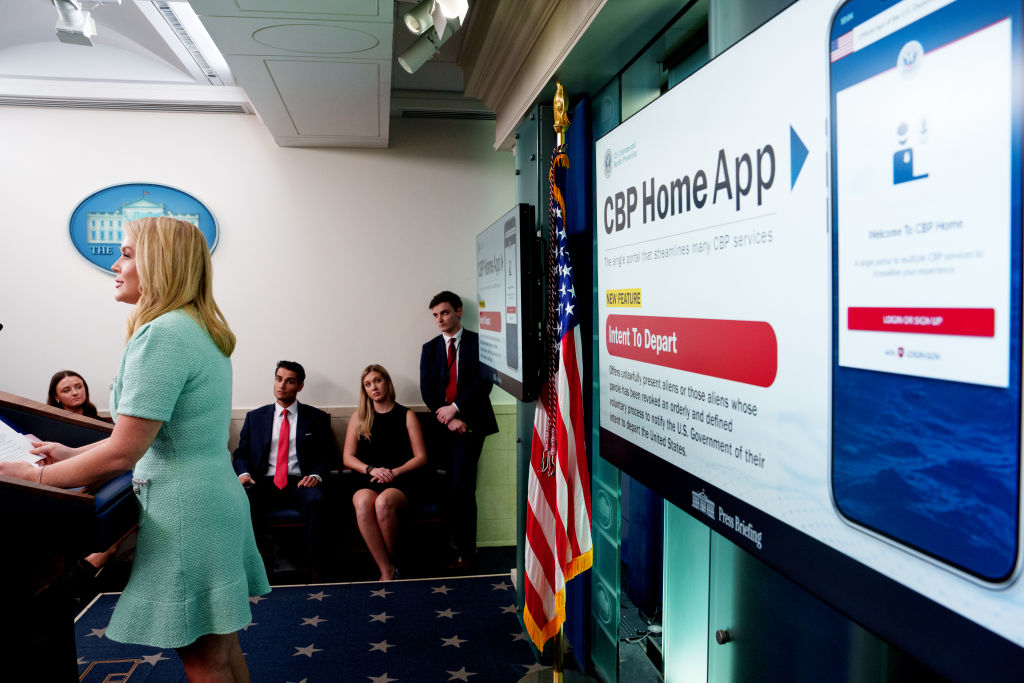“We’re Being Robbed of Time”
Two women share what it was like to lose their husbands to “self-deportation.”
By Anna Lekas Miller
Ordinarily, Julie is a night owl. She is used to staying up late while her husband, Neftali, whom she affectionately calls “Nef,” goes to bed early to wake up for his construction jobs.
Even these days, “I find myself tiptoeing around at night, trying to be quiet,” she says. “Then I realize he isn’t there.”
Neftali didn’t pass away—in October, he made the difficult decision to “self-deport” to Mexico, leaving Julie, a U.S. citizen and business owner, behind in Newark, New Jersey. And like a growing number of families in Trump’s America, they are now living separated by a border, wondering what they have to do to find their way back to each other.
Julie, now 47, and Neftali, 45, first met through friends in 2008 and started dating in 2011. Back then, she didn’t think it was a big deal that he didn’t have papers. But when Trump first came to office in January 2017, they started getting nervous. The two went to City Hall to tie the knot, just to be safe. “We didn’t want to take any chances,” she says.
But when they went to adjust Neftali’s status, they were slapped with a rude awakening. Even as a U.S. citizen, Julie couldn’t sponsor Neftali—long before they met, he had crossed the border twice, and because of a piece of Clinton-era legislation, this meant that he was ineligible for a green card. At the time, they decided to do what they always do—look over their shoulder and stay away from police. But as Trump’s second crackdown on undocumented immigrants began, and they started to hear more stories of people being detained and even disappearing, Julie and Neftali began to reconsider their lives in the United States.
When the couple finally decided it was time for Neftali to leave the U.S. last month, Julie traveled with him. “I spent five days with him in Mexico, and it was one of the most painful, but exhilarating experiences.” Julie says. The moment there was no longer a threat of Neftali being arrested, she adds, both of them felt immense relief.

It is difficult to know precisely how many people have self-deported from the United States. The Department of Homeland Security claims that 1.6 million individuals have done so using the CBP Home app, but this number has been disputed.
Julie and Neftali represent one of 4.5 million “mixed-status” households across the country. Some of these households include a U.S. citizen married to someone without papers; others include children born in the United States to undocumented parents. All undocumented individuals are vulnerable now, but statistically, it is men who are more frequently targeted during ICE raids; when they are forcibly removed from their families, be it through arrest or self-deportation, their spouses and children are left behind to navigate a cruel system.
“We’re being robbed of time together,” Julie tells me. “When I’m having a bad day or a bad moment, I can’t feel him close like I do when he’s here.”
“We weren’t really living.”
Several states over, in North Carolina, Jenni Rivera, 54, and her husband, Fidel, 48, share a similar story. Jenni is a high school math teacher; Fidel, an electrician. They have two children together and met salsa dancing almost twenty years ago. “It was like the beginning of any relationship—we just couldn’t get enough of each other,” Jenni recalls.
Even though Fidel had been living in the U.S. without papers when they met, Jenni assumed that she could fix it through marriage. But when they went to an attorney, they learned that he would likely be barred from re-entering the country for 10 years if he tried to adjust his status. “At the time, we had an infant,” she tells me. “There was no way that I was going to separate my spouse from his daughter for 10 years.” So Jenni and Fidel accepted that they would continue to live in the shadows.

“We didn’t go anywhere [that] we couldn’t drive [to],” she remembers—boarding a plane and having IDs scrutinized by TSA agents felt too risky. That meant no more trips to Florida to see her family, and no vacations that weren’t within a short drive of their home in North Carolina. In the summer of 2024, Jenni took their daughters—both U.S. citizens by birth—on a road trip across the country, but without Fidel, it felt empty. “I knew he would love the prairie dogs,” she laughs, recalling a stop in South Dakota. “He would be making up stories about them, having ridiculous conversations with them, telling the girls stories from when he used to be a rancher.”
Over the years, it felt like the box they lived in was getting smaller and smaller. Even though they had all of the hallmarks of a good life—stable jobs, a nice house, two wonderful children—the constant threat of deportation made her painfully aware of the fact that she could someday be on her own.
“I could feel the walls closing in on us,” she describes. “We were living, but we weren’t really living.” Still, a lawyer had told Jenni that if Fidel ever got arrested, she could bail him out, and they would eventually have their day in court, where an “extreme hardship” provision in immigration policy might allow Fidel to stay in the United States. That gave her hope, but then, in September of this year, the Board of Immigration Appeals took this option away. “They blocked the one chance I had to fix anything.”
As time wore on, too, things got scarier. Detention centers, like Alligator Alcatraz, started popping up, and Jenni realized that Fidel might not just get deported—he could be detained for months, or disappear entirely. “My husband is such a good human. I did not want him to be in any of these places that we were hearing about,” she says. “I couldn’t live with myself. I wouldn’t be able to face my kids again.”
So, on October 10th, they celebrated their 17th wedding anniversary. They carved pumpkins and ordered pizza with their girls. Then Jenni helped Fidel pack for his flight to Mexico.
“It was really sad at the airport,” she tells me. “But I’ve been staying busy. I think it’s really going to hit in the quiet moments.”

“Our plans look a little different…”
One of many frustrations that Jenni and Julie share is the amount of apathy towards immigrants that they witness among other Americans. “It isn’t just about deportation anymore,” Julie says. “It’s about detention and people disappearing and making money on detained bodies. I’m disappointed more people aren’t outraged.”
“They are destroying families,” Jenni adds. “I can’t understand what these people did that was so bad that you would want to rip the foundation of their life apart.”
Since Fidel left for Mexico, Jenni has been focusing on helping her oldest daughter with college applications. “I know if they want to come to me, they’ll come to me,” she tells me when I ask how they’re doing. “I don’t want to burden them.”
Meanwhile, Julie is continuing to support other mixed-status families through American Families United, an organization that advocates for legislation like the Dignity Act, which would allow undocumented immigrants to regularize their status provided they pass a criminal background check and pay any taxes that they owe. She’s also looking forward to the next time that she can visit Neftali in Mexico—and hopes to eventually move there.
“We talk every night,” she says. Sometimes, they reminisce about the past; mostly, they look forward to the future. While they once thought this would be in the United States, now they know that this will be in Mexico.
“Our plans look a little bit different than how we thought they would look,” Julie says. There are logistical issues. Neftali had been paying for his niece’s education, which is going to be more difficult when he’s earning in pesos instead of dollars. Julie is working on finding a way to pivot her business to something that she can do from Mexico.
“I don’t want any more time to be stolen from us,” she adds. “We’re going to work as hard as we can, so we can have a beautiful future like we always planned.”
“I feel a sense of freedom,” she says. “It’s just not in the United States.”

Anna Lekas Miller is a writer and journalist who covers stories of the ways that conflict and migration shape the lives of people around the world. She is the author of the book Love Across Borders and runs a newsletter by the same name. Follow her on Instagram: @annalekasmiller.